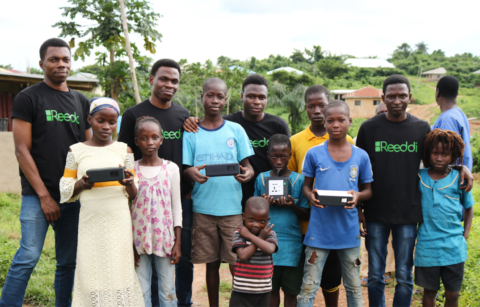
“By combining technology and social engineering, our goal is to make electricity access as easy as buying milk in a corner store” Olugbenga Olubanjo, CEO of Reeddi, a startup supported by NEX.
by Nivisha Shah, Global Impact Manager at New Energy Nexus
That’s why striving for justice, equity, diversity, and inclusion (or “JEDI” for short) is fundamental to our mission. It’s also close to my heart since before I started working at NEX three months ago as the global impact manager.
To find and support diverse entrepreneurs around the world, we need to get savvier about our own blindspots and our own assumptions. So, we started in 2022 by organizing our first JEDI week, where we invited JEDI experts and brainstormed our strategy to achieve JEDI goals.
Every journey starts from within. To see the change in the world, we will first need to build a solid foundation by looking within and digging deeper to find our own “Why?” It was rather a humbling experience to see my colleagues reflect on their privileges and share their experiences dealing with systematic barriers. Although this process required them to be vulnerable, their commitment to the work was evident as they looked within to find their “WHY”.
Being a global organization and committing to supporting underrepresented communities in their entrepreneurial journey will require a lot of intentional work to understand each geography’s JEDI needs. New Energy Nexus has committed to using a global perspective in its JEDI work by ensuring global representation on its JEDI council; however, there is still a lot more work to be done to ensure the process is equitable and that it is not driven purely from the Western perspective.
JEDI decision-making must be part of our DNA. We have committed to start our journey by defining what JEDI means to us both at the country and the global level. For us to empower entrepreneurs from underrepresented and underserved communities, we need to continue to build trust with our stakeholders. We start by preparing our leadership and teams with tools and coaching to build their emotional intelligence (EQ), practice empathy, recognize and manage their biases, and lead with curiosity. Only then will we be able to provide space for entrepreneurs to be their authentic selves and trust us to have their best interests in mind.
NEX has started this already. We’ve adopted an “Equity In Equity Out” model in our CalSEED and CalTestBed programs in California, which aims to ensure that traditionally excluded communities across California fully participate in the development and implementation of clean energy solutions and we encourage entrepreneurs to explore innovative ways to bring equitable, clean energy solutions and opportunities to our most vulnerable populations. To that end, we have partnered with the Greenlining Institute and other social and environmental justice organizations to ensure our programs champion equitable outcomes and opportunities for a diverse range of entrepreneurs.
NEX has also joined as a signatory to the international Equal by 30 initiative for gender equality, joining 13 countries and more than 100 organizations in supporting equal pay, equal leadership, and equal opportunities for all.
We absolutely recognise that we need to do more to scale this even further across our organization.
Mistakes are inevitable but what is essential is that we commit to learning from our mistakes.
Our JEDI journey will have challenges varying from defining what JEDI means to us to figuring out ways to be authentic to our values while working with systems and organizations that might not align with our JEDI goals. We won’t know how to overcome these challenges until we try without the fear of failing. I know that this work will be a learning experience – it won’t be a straight path towards a goal. This requires introspection and consistently revisiting our “WHYs”.
The sessions during the JEDI week brought to my mind a quote from meditation teacher and practitioner, Barry Gillespie:
“The path isn’t a straight line, it’s a spiral. You continually come back to things you thought you understood and see deeper truths”.
We will aim to put learning as the focus through this journey.
Last but not least is where my heart truly belongs, as Impact Manager at NEX: measuring success.
I was excited to see that we are going beyond planning our JEDI journey and committing to measuring our success. I consider this a step further because we also commit to holding ourselves accountable by committing to measure. This reminds me of what David, our appreciative inquiry workshop facilitator said:
“What we ask determines what we find, what we find determines how we talk, how we talk determines how we see our future and how we see our future determines what we create”.
To create an equitable, inclusive and diverse space for our entrepreneurs and the communities they serve, we will need to ask the right questions and hold ourselves accountable throughout our journey.
We are committing ourselves to funding, resourcing, and holding ourselves accountable so that JEDI isn’t just an afterthought, but continues to be a critical part of the way we operate.
We know that doing so will mean we are building a better place to work, but also better equipping ourselves to deliver on our mission to support even more climate entrepreneurs.